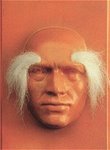
Regular readers may recall that last week’s tips column was the first part of a two piece series about whether or not to show your cards when you don’t have to.
The first part detailed a situation in which a player made a huge mistake when he let an egotistical opponent know he had made a correct lay down.
This week, let’s start with another example.
It’s a NL game and an opponent, let’s call him Rocky, raise to four times the big blind from mid position.
You are on the button with ten-nine of diamonds and decide to call on the basis that, against a rock, you are highly likely to have two live cards. You also have position.
The flop slaps: 7h,8h Kd.
Rocky instantly bets sixty percent of the pot.
Even a player who has had his brains scooped out with a spatula can put Rocky on AK.
You also have the straight draw and, because Rocky is so tight, he is going to be conscious that you may have flopped a set: a lot of players will flat call raises with pocket pairs in an attempt to break their opponent should a magical third one hit.
However at the moment, it might be worth letting the pot develop. The bet is bearable and you may receive a free card if he checks the turn.
The turn card is the two of hearts.
Rocky tenses up.
Massive, hooting klaxons are reverberating in his ears.
Get this everybody: there is a flush on board.
He checks to you.
You pause, just long enough for the pain of the flush to sink into the very depths of his soul, then bet eighty percent of the pot.
Rocky feels like Wile E. Coyote when he realises he has just left terra firma and gravity starts to gently tug his tail.
Rocky thinks.
Rocky folds.
At this point, it is worth giving serious consideration to flipping over your cards and giving Rocky a gentle shove into the abyss of tilt.
If you don’t, he’ll be so sure of his decision that he won’t be psychologically affected.
However, by shoving ten high in his face, there is a good chance that you will penetrate his normal rigid strategy and he’ll start trying to pepper you with bullets.
Showing your cards should definitely not be overdone. You can yield too much information about your game. Moreover, so many of the frequent, multi-tabling players will be using statistical tracking devices and every hand that is shown will be logged in their databases – why give them more than you have to?
However, should you find yourself in a game in which all players are folding to bets, play loose and let them see a bluff every once in a while.
Make sure the pot is large enough for the show to have an impact and combine it with a small ‘ty’ or ‘thought so’ – anything that makes you appear cocky and arrogant.
If you gauge it correctly, you can turn a poker quarry into a gold mine.


No comments:
Post a Comment